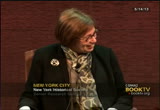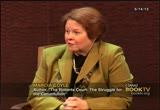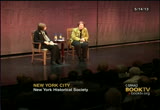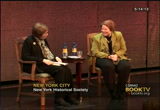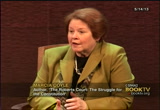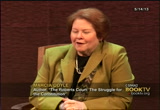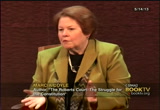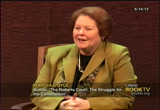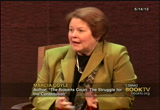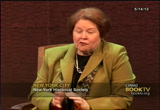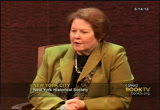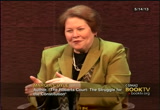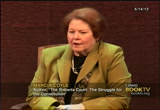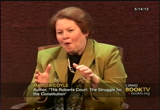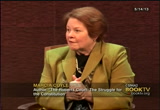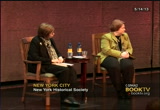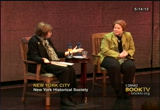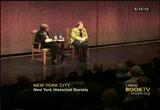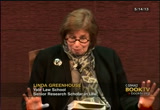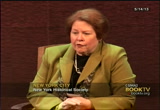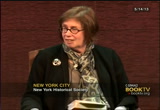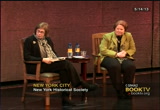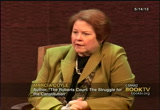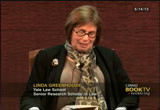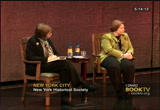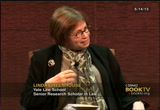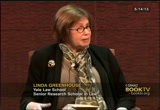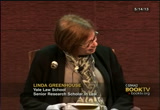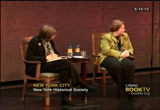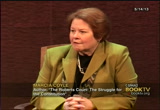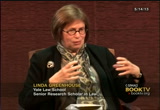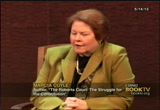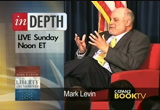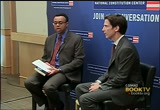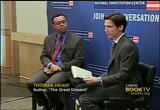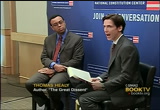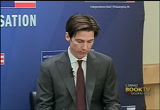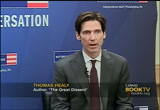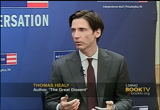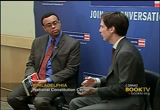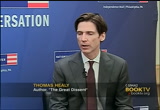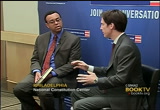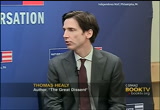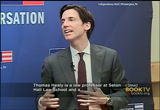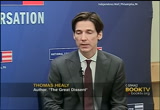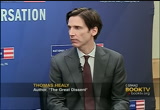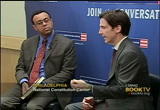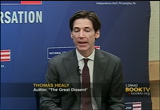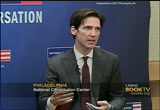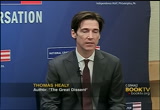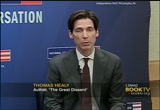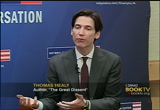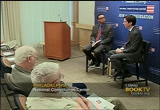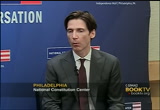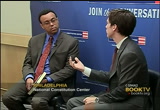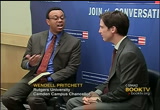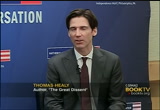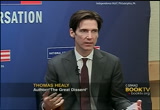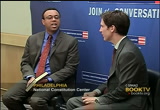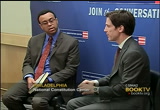tv Book Discussion on the Great Dissent CSPAN December 30, 2013 8:55pm-9:56pm EST
8:55 pm
i am asked that all of the time but i will save my answer because i am interested in yours >> the five judges who voted no, i don't think they have regrets. the ones i talked to felt this was an obvious way to go. last term the court had a petition come up involving the state of montana. they had a hundred year old law that banned corporate elections. and they said citizens united doesn't play. we have a history of how corporations owned the montana government and we don't want to go back. it was challenged again by the
8:56 pm
lawyer who brought sit citizens united. at the supreme court, they said sorry, citizens united applied even though two justice said it might be good to look at the law perhaps the premise which citizen united is based on is weak if you look at what is happening with money in election but the court didn't have a signed decision. it just said we are not going to hear the case. citizens united applied. >> they overturned the montana's supreme court's ruling? >> yes. i call this a bold conservative
8:57 pm
majority and this is a good example. there are no regrets. i am not sure what might happen if guns comes up again. but i would be surprised if they backtrack on the district of columbia gun decision. they will probably not backtrack on the individual holding rights. but i think it will be interesting to see what they say on questions that are coming about gun regulations and what kind of scrutiny the court should give to gun regulation. no, i think this court doesn't have many regrets yet. >> what surprised you the most that you uncovered? you have a few interesting tidbits in here. >> tell me what they are? >> some back stories.
8:58 pm
citizens united. the case was reargued and wasn't on the list of major cases. so what happened there? >> the concenus was the deputy being questioned by the chief justice and presing him on how far the argument would go in terms of regulation of corporate spending. and he made a concession that the government could ban books. he meant you could regulate the
8:59 pm
money that was used to publish the books. but it was an ah-ha moment where they thought it was astounding. and then after that we get the announcement that the court is going to rehear citizens united and it is going to consider it. it said specifically and this was the court's own question on whether it should overrule the 1992 ruling that did ban the use of corporate funds in the federal elections. ...
9:00 pm
of going to write a fairly narrow decision. this case involved a movie. a movie that have highly critical of hillary clinton, and one of the questions before the court was, you know, whether the law even applied to the movie. and the chief -- we've come to unction, was going write a narrow opinion saying that it didn't. and that would have been that. >> that wouldn't have meant very much. >> to, it wouldn't have. justice kennedy, and justice scalia, but justice kennedy for
9:01 pm
a long time made it clear that the 1992 decision banning corporate expenditure was wrong. and they had said that in several decisions after words, and this was sort of the er than what the chief justice was going write, and suddenly the chief justices majority swung to justice kennedy. and the chief justice had to decide, you know, what was he going do? because he had just in, i think it was 2007 in another case brought by him citizen united supreme court had a affirmed the 1992 decision and the key provision in the mccain law.
9:02 pm
>> exactly. he wrote a concurring opinion that was focused really solely on the concept of standing by prior decision. this it opinion, why he should not standby those prior decisions. what was going on at the same time the justice. he had been assigned the decent by justice stevens. and he wrote a blistering dissent about the fact that the court was going to release an opinion. it was before second argument, and rule on issues that really were not before the court. the citizens united organization had abandoned a big challenge to the law in the lower courts. there had no briefing on those issues before the u.s. supreme court. and he basically said this is not the way we do things around
9:03 pm
here. it will be nidis sent that is not the way we should be doing things. that's why i was told there have an constitutional button than if, you know, the court is about to do something, that might look bad for the court in terms of its constitutional representation. >> not to use the word activist. >> right. okay. they -- they pressed it hard with the chief justice. it's really why -- the justice said to me and a number of them said to me they don't remember if they took a vote on reargument citizens united or whether of it just consensus that it should be reargued. but that is why they said they
9:04 pm
reargued it in order to give the lawyers in the case more time, an opportunity to brief the two questions that the court presented. it was sort of a little disingenuous of justice kennedy ultimately in the citizen united decision when he opened by saying something to the effect that the case raised these issues, and yet as was pointed out in the dissent the court raced the issue not the case not the lawyers initially anyway. so that's really how to came about. justice stephens ended up writing the dissent because justice retired from the bench. and so -- >> they at any time have him to kick around anymore? >> no. >> we're going to keep talk for another minute. you see the two standing mic
9:05 pm
here. if people have questions you can start lining up. >> there's a look in the book too about how the justice do their job. they did talk about what it means to have new justice coming in. and how it affects them. in effects in some cay the injuries prudence, as one said. the old alliances are suddenly gone. you can fend on them to vote a certain way because they agree with you. suddenly t no longer true. another justice talking about how being on the court is really like being in a marriage. you're there for a long time. you have to learn you know what sort of things pick off another justice when to, you know, got bat and when not to with interpersonal relationships. some justices like a close personal relationship. others, you know, prefer a
9:06 pm
little more distant. it's really interesting how the changeover affected them. >> number justice stephen's lovely memoir by the chief, he said that the he thinks the most important thing that happened during the renner qis court was the retirement of the thurgood marshall and his replacement by clairn thomas. i think one you can say the most important thing to happen was sandra day o'connor's retirement and replacement by justice alito. >> absolutely. you can't underestimate that. they were both conservatives. different kinds of conservatives. justice alito is much more conservative than justice o'connor was. he has tipped the balance in certain areas of the law. he has tipped the balance in abortion. his very first term. he tipped the balance in
9:07 pm
campaign finance, and. >> and on race, yes. one of the key decisions on affirmative action is very much in play in the cases out of the university of texas that the court will decide probably before june. so he's been very important change. and she was the center -- what we call the swing vote and once she left and justice alito came on. justice kennedy really moved in to that swing vote category. i had does not swing to the left as justice o'connor was willing to do. that's all sort of solidified the conservative majority on the court. >> i think it's probably time to start questions. i'll alternate but start over
9:08 pm
here. give your name. >> [inaudible] supreme court justices put a lot of energy in the dissending opinions. does it bear flute a positive way? >> absolutely. i think justice ginsburg said dissending justices write for the future. and perhaps the best example of that was chief just is renner qis. he was known as loan ranger in his early years on the court because he wrote dissents and often wrote them for himself. but once the court began to shift to the right, he started to see some of what he believed in become majority opinion. so yes, i'll tell you a funny story once. i was having christmas lunch in d.c. and justice scheeg --
9:09 pm
klieg ya was having lunch at the nearby table. why wouldn't we send over, you know, it was an italian restaurant, obviously. why don't we send over an after dinner drink to him as, you know, spirit of christmas. well, he didn't accept it. he came over though to explain. he said he would have accepted it, if he was writing a majority opinion but had to write a dissent. he needed a clear mind for that. [laughter] >> what do you sympathy going happen when about a dozen people aciewnted for about 80% of the super pac money. where do you think the country is going go if we can are going to continue on this route, which is clear the conservative majority is going continue on this route. so you're going have just a very handful of people controlling
9:10 pm
the vast majority of money that is spent on political elections. the supreme court will say go to your congressman. there are attempt being made not scefltly to change a federal election loss in order to want to at least provide more public disclosure who is behind the funding of campaign. they haven't been to be get that through congress. so again, -- it's not 1900% clear. disclosure laws would be upheld. >> that's right. exactly. the court did it in citizens united on eight justices who did endorse the disclosure current
9:11 pm
requirements. only justice thomas dissented in that decision. i know it doesn't look very hopeful i think that congress is the way they're on a deeing regulation trend until the supreme court. >> what can change normal terms of obama or anyone else couldn't even get through nominations for regular courts though supreme court. >> the presidential elections do matter. >> hi, i'm jim. my question deals with roberts vote on the health care issue. do you think he was motivated by the fear that the court began to look like a political entity rather than a jurisprudence entity? >> you're welcome to speak to
9:12 pm
this too. it's probably one of the most common questions we get, isn't it? >> yeah. do i think so? no. i take him at the word. i take him as sincerely trying to grapple with the issues presented in that case. i think he was first inclined to vote with the four conservatives and strike the law down as violating the commerce clause. when they came back and staid means entire law goes, not just the mandate, and not just the provisions of the law that are economically tied to the mandate guaranteed issue and community rating. but we're going take down the entire statute. i think -- my sub decision. i haven't been able to do any reporting on it. my position was it was too much for him. he's more of a minimalist than
9:13 pm
the folks to his right. and more of an institutionalist. i feel like he must have said to himself there got to be another way of the mess. the tax question had been presented and argued both by the solicitor general and others who -- in the case and that was there for him to rely on. i don't think it was a, you know, cynical or strategic move. i think it was a rather desperate move to extract something from what would been something much too far for him. i agree with that whole heartedly. i think the media really did focus on the commerce clause issue in the case. to the exclusion of the tax issue almost. it was always in the case and when the case got to the supreme court, the solicitor general
9:14 pm
really beefed up the argument. and there is this doctrine that if the court can find a way to interpret a law in a constitutional fashion versus an un-- striking it down that it should take the pac that uphold it. i think he found that pac power was the right. >>? for people interested in the health care case. i'll plug a book thatcom out this week. published by oxford university press called "health care case" it consistencies of 20 essays and different aspects of it. i wrote one of them on my what my view of the chief justice. it's a nice little book. >> it's a as fascinating case will there was so much going on outside the court too at the time. you talk about special interests
9:15 pm
so many organizations. so many law professors and others who wanted the court to go one way or the other were writing constantly. there are speeches on the floor of congress about it. i can't remember a time when there was a strong effort to get justices recused from the case as we saw with the effort against justices kagan and thomas. so it's really a fascinating case. it's worth reading what linda just suggested. and my chapter in the book. [laughter] >> sure. >> hi jack mac ken city. >> i can't see you with the lights. yes, you are jack mackenzie. >> it's nice to have you come this way. i would like both of you, if you could, to comment in some substance about what justice o'connor has said. i'll say one thing about it.
9:16 pm
i would love to hear anything you would have to say about it. her participation in the bush against gore was not a slip of find. during the oral argument she ridiculed the -- she was really heavily engaged in the case. what is your view of -- what do you think about now that she's made this comment? >> well, i think she -- first of all, it's not unusual for some justice to have regrets or second thoughts about decisions they have made. i think with justice o'connor, she has seen a good part of her legacy endangered by the fallout of bush v gore and the more conservative justices that have seated her on the bench.
9:17 pm
i don't know that i can say anything more. she didn't really elaborate a lot. she said maybe we shouldn't take the case. what can you do with with the case? so -- >> it wasn't a full recantation. it wasn't, you know, after justice luis pol who cast a deciding vote in 1987 which projected the gay rights claim, in that case, and after he left the bench he said he felt he had voted the wrong way. >> she didn't say that? >> it's hard, you know, i don't want to attribute to her a kind
9:18 pm
of a global regret that she doesn't steam feel. >> sir? >> my name is tom. this is a question out of shared ignorance. i left law school about 50 years ago. i guess i can reveal the law school by saying another first-year student that year was justice scalia. i'm curious about the history -- you're talking about the roberts court. and roberts the is newest justice when he became the supreme court chief just is what the history of having the newest justice be the chief justice when in a academic university head of the history of the english department of someone with senatety. the head of the committees have senatety that is how they got head.
9:19 pm
the implication being there longer. therefore no wiser. when you talk about the roberts court and yet he was -- he became a supreme court justice -- what does that say if it's the roberts court. b. with what is the history we oob i'm sure, he's not the first chief justice who arrived in court as -- >> there have been a few just ises promoted. william was one of them. typically they have been just picked out of a hat and all of a sudden it's chief justice. it's interesting it's a pattern that george washington established by naming john jay as chief justice -- first chief justice of the united states. the constitution article iii of the constitution actually doesn't say that.
9:20 pm
it says there shall be one supreme court. and article iii of the judicial article doesn't even mention the chief justice. it doesn't ascribe any functions to the chief justice. we only learn that there is a post chief justice because elsewhere the constitution it says that the chief justice preside over the trial of the presidential impeachment. so, you know, it scrolled been otherwise. there was six justices on the court. but, you know, on what it is. we kind of from the very beginning got elected to that. and you can do it. and, you know, on the federal court of appeal. the chief just judge in fact is the senior among those who have not yet reached the age of 55.
9:21 pm
that person becomes chief judge for seven years, i guess it is. yeah. >> what you think? >> suggest that the office of the role is not as important and why could we not develop a system where the chief justice is in fact the senior justice and fellow with the most experience? >> there would be nothing unconstitutional about that. if you're a -- originalist. there would be -- well if you're an originalist who goes by the intent of the framers. those who frame the constitution seem to assume that somebody would be nominated and confirmed to a position of chief justice and hold that position for life. that's the original understanding. it's an interesting question. >> i agree. i couldn't add to that. but whether it means that it really is the roberts court or the renner renne qis court. i think it's part just tradition
9:22 pm
we call it that. i will say that during one of the interviews i had there was a justice who said he didn't understand why supreme courts call after the chief justice's names. he said why should chief justice be blamed for what that court did? and suggested instead that the court be named after the president who named the last justice to the supreme court. which would make this court the obama court. which i think could woman as -- would become as a big surprise to president obama. [laughter] >> okay time for one last question. >> i share your thoughts, please, on the testimony of the roberts case during the conformation proceedings and specifically whether you feel he was perfectly candid? >> whether he was candid during the conformation hearing? >> i think he --
9:24 pm
9:25 pm
he was -- who excoriated him for, you know, foe -- faux judicialist -- it was in a short time we saw different john roberts emerging. and we saw a different dynamic on the court. i think in response to what was going on, you know, behind the -- well, but also in the areas that he had very -- the second term, 2006 -- '07 term they took up the seattle louisville school district case. >> very did different term. >> very different. very devicive and many 5-4 rulings. they were issues i think he had rather firm views on.
9:26 pm
9:27 pm
calling and waiving around the declaration of independence and the constitution. many of you, ten years ago, you never gave it a second thought. now i bet it's at the front of your mind. it is with tens of millions of us. we have to goat as many of the people. the truth is, i'm not trying to pat myself on the back. that's the purpose of the book. it's the purpose of liberty and journey. i consider part of the purpose of the radio program as a number of my brothers and sisters in broadcasting, which is why we are under attack all the time. [laughter] are the utopian statists. live for three hours starting at noon eastern. booktv's in-depth, the first sunday of every month on c-span2
9:28 pm
. >> thomas exam the limited excerptation of the first amendment of the 20th century. and the transformation opinion in the 1919 case. the author reports that first amendment rights were often stifled prior to the opinion and the justice himself was once a skeptic of the right to speak freely. this is about an hour. >> thank you. congratulations. ..
9:29 pm
to begin with you would read just one page from the book, page four and i will preview this and let thomas explained that this is actually not thomas is writing. it's somebody else's, just as holmes and i think it helps us capture very well the issues that he was struggling with and what's so great about this look so i will give you my copy. >> thank you, thank you. this was some -- from whom' dissenting opinion in the abrams v. united states. this is the first case in which homes defense the importance of free speech and thus is a real turning point in our history of the first amendment. it's an incredibly powerful dissent especially the last
9:30 pm
paragraph in which holmes tries to explain in a philosophical way why it's important that we have free speech and what's interesting about the last paragraph is that it against and a rather strange, almost in congruous way, as those holmes is making the case against free speech and not for it. persecution for the expression of opinions seems to me perfectly logical. if you have no doubt of your premises or your power and want a certain result with all your heart you naturally express your wishes in law and sweep away all opposition. to allow opposition by speech seems to indicate that you think the speech impotent as when a man says -- the circle or you do not care wholeheartedly for the results or that you doubt either your power or your premises. at this point holmes shifts direction almost very suddenly
9:31 pm
and very brilliantly in my mind. but when men have realized that time has upset many fighting faiths they may come to believe even more than they believe the very foundations of their own conduct that the ultimate good desired is better reached by free. and ideas, that the best test of truth is the power to get itself accepted in the competition of the market and that truth is the only ground upon which their wishes safely can be carried out. bad at any rate is the theory of our constitution. it is an experiment as all life is an experiment. every every year it's not everyday we have to wager our salvation upon some prophecy based upon imperfect knowledge. while that experiment is part of our system i think that we should be eternally vigilant against attempts to check the expression of opinions that we loathe and believe to be fraught with death unless they so imminently threaten immediate interference with the lawful and pressing purposes of the law
9:32 pm
have an immediate check is required to save a company. >> thank you. we will talk a little bit about the first amendment that of course that parrot wrath is more then the first amendment. the way of thinking about our democracy. before we get to that i would love to hear a little bit about yourself. you are former journalist so i understand why you would the interest in the first amendment as a journalist but what street to this topic? >> it's not just self-interest that i would want to write about the first amendment. as i said this dissent i holmes represents a turning point in our nation's understanding of the first amendment. it marks a turning point in holmes's life as a justice and a thinker but it marks the beginning of a larger transformation in the way we think about free speech. prior to 1919, free speech in this country was pretty much an empty slogan. it wasn't until filled from us.
9:33 pm
and so the history of the protection of free speech in this country begins in 1919. it begins with a series of cases dealing with the espionage and sedition acts that were passed during world war i under which many socialists and pacifists were convicted. the court hears a number of cases in 1919 and then in those early cases the court upholds the convictions of people who were prosecuted and holmes himself writes the opinions upholding these convictions. and then he turns around eight months later in writes this dissent. when the first amendment professors teach the first amendment they begin with these cases and they begin with holmes initially upholding these convictions and then suddenly eight months later the writing is a very powerful dissent. so when i was a student this is how i learned the first amendment and it's how i teach
9:34 pm
my students but there has always been this nagging question for me, why is it different for holmes eight months later? we tend to gloss over it as though oh well the facts of the cases were different or an easy explanation. that didn't sit well with me and i thought there must be something more to it. i was hoping to write a story. i wanted to write it look that was more than just a kind of academic analysis of law that had you know some richness to it. i started thinking about how important it was to the history of free speech and when i began to dig into it became clear to me that it was an incredibly moving and effective story that
9:35 pm
involves more than abstract ideas and involves human relationships so that is how i got thrown into it. >> tell us a little bit about the process of research and writing. how did you actually enter this question. was the sources you thought were particularly revealing some ou talk to the new holmes? there might be a few or were there questions you wanted to answer? how did you engage the topping to get into this wonderful book? >> i started doing preliminary research reading all the biographies of holmes and reading his published letters. he was a very prolific correspondent and although he instructed most of the people he corresponded with to burn his letters thankfully most of them did not so most of them survived. so i started reading the letters in the published ones became published once all of which are at harvard.
9:36 pm
i started making a timeline of holmes's life during this period of time from roughly the middle of 1919 until sometime in 1920 and i made it day by day timeline of everything going on in his life. the case is court was decided the letters he was writing and the books he read. he kept a list of every vote he read in his life from his 30s on any red etan. just the titles of the books that he read and he would read in the summer sometimes 40, 50 or 60 bucks during his summer recess. i started reading some of the books that he read trying to find little clues and scoured newspapers to figure out what was going on. i looked into what was going on in the lives of the people he was friends with so i created this timeline. we know it's a two-year timeline
9:37 pm
and i just kept looking at it. and thinking about what's going on in his life and how all of these pieces fit together. for me, that's when i really began to understand why he changed his mind. there is in some smoking gun. there is not one moment you can point to and say are hot that's why he changed and when he changed it. it's a kind of gradual process but in order to really understand that process you have to see it in order in chronological order and i think that's what i had been missing prior to this vote. there were some scholars that delved into this a little bit and pointing out that some pieces of the story but at least to my mind it was never clear how it knits together. so when i saw that in the timeline, for me that was where the real sort of revelation came >> that's wonderful. before you and i were talking about historians and as a
9:38 pm
historian i will tell you it's a wonderful book. what's interesting is what you just described it on thick most historians would have approached it that way so that's why it's wonderful we have lots of people doing history. this might be pushing it a little bit of the kind of approach it as a journalist. >> right, i did and as a storyteller really. the advice that i tried to get myself was the advice that novelists usually get which is to show and don't tell. i didn't want to tell the reader why holmes changed his mind. i wanted to show holmes changing his mind. there were a few times in the narrative where i is the narrator interject commentary or analysis. there are some times when i have to but for the most part i try to let the events speak for themselves and i hope that they do, and i hope in the reader finishes, the reader understands everything that i would have told the reader that i sat down and said here is why holmes
9:39 pm
changed his mind, bullet .1, bullet point to in bullet .3. that is what academics are used to but you know a i don't think that doing it that way gives you as rich a sense of what's going on. i think you missed something and it's just not as fun for the writer or the reader to do it that way. >> in our second talk about the people that influence and versus talk about holmes a little bit. as you acknowledge for a jurist holmes has gotten a fair amount of attention here there are several books about them but he still a fascinating purpose. give us a sense from your perspective as someone who immersed himself in this important person. how would you describe the flaws and strengths would you describe as him having? >> first a couple of basic biographical details. holmes is born in 41 so he fights in the civil war and the
9:40 pm
union side of course. he comes from an old austin family. his father is more famous than the sun were longtime well-known as a writer and medical professor and coined the term boston brahmin. holmes goes to harvard law school and fights in the civil war and is wounded three times, twice nearly dies. he throws himself into law after the war and becomes a judge in massachusetts and is appointed to the supreme court. my book takes place when he is at the latter stage of his career. he is around 77 years old when the book starts and he has an odd reputation at this time. he's not the looming figure that he has for us today. he is generally regarded now as the greatest judge in american history and we could quibble about that but you know you can
9:41 pm
say that and back it up reasonably. when the book starts that's not the case. he was a very philosophical cerebral person. a lot of people were sort of skeptical of the way he approached the law. he seemed to cerebral and too smart for his own good. one critic described him as a literary fellow. he cared too much about the way he phrased things and not a soul is as -- solid he should be as sort of obscure in the way he writes but to a growing group of young progressives and intellectuals he's a really inspiring romantic figure because he does have this philosophical poetic quality to him. he is given these very moving speeches about having fought in the war and he has coined all of these terrific phrases and his
9:42 pm
opinions are so much livelier and more interesting to read than any of the other justices on the supreme court. and so, for the young men in the book that influence him he is the sort of philosopher poet. he is a breath of fresh air in a musty world of government and law. so i think that's his real strength is that he sort of breaks out of the law. he is more than just a judge. he is really the only judge in american history is that as a folk hero and i think his great contribution is partly his opinions but more so just the persona that he created so i think that is the real strength. a weakness is that he didn't always think through his ideas
9:43 pm
as fully as he might have. he becomes a little sloppy in the later parts of his career. he just relies upon things that he said earlier and his life becomes in a way almost a closed loop. so when you read things that holmes writes sometimes they don't always add up. it's not always internally coherent or consistent. that being said i think that's one of the fun things about holmes is that there are all these contradictions and tensions in a very rich complex character which if you want a character in a book, that's what you want, in a contrast to fellow justice louis brandeis who writes in the eloquent -- of free speech. it's pretty clear for brandeis why he believes in free speech and therefore it's less interesting because i think that
9:44 pm
he doesn't give us a way to explore our own mixed feelings about the issues. >> lets talk about the people that influence him. as you mentioned there were a lot of young people who look up to him and also try to influence him. there are so many i don't think you can cover them all in the next 10 or 15 minutes but i will allow you to pick a couple that you think are particularly interesting in relative. >> mostly these are young men ,-com,-com ma intellectuals, lawyers, academics, mostly regressive if not radical and quite a few are jewish which is interesting because holmes comes from this old boston family and they are young. so what one of the most influential is a man named harold lietzke. most people don't remember although some may of heard of him he at the time was 24 years old. he isn't struck her at harvard, and incredibly liberal just to
9:45 pm
the right of marks and he later goes on to become a leader of the labour party during wolf or two. holmes views him almost as the a son. holmes had no children and the two of them just hit it off, even though they were so diametrically opposed in so many ways in terms of age and religion and political beliefs. holmes admired black ski. he's an incredible brain young man with his irrepressible personality and so black ski has an incredible influence on holmes. felix frankfurter is another individual. this time he's a young law professor and he later sits on the supreme court in holmes' seat. he has an important influence on holmes. the editors in public magazine which at that time was new and founded in 1914 so was the new
9:46 pm
republic, not the old new republic that we know now. they were close to holmes and holmes didn't generally read the newspapers but he read the new republic areas these men and more gathered and congregated around the house in washington d.c. and did not circle. they called at the house of truth. they called it that the causes served as kind of a literary salon where these young thinkers would gather and talk about current events of that day but also larger questions of philosophy. holmes would stop in after a hearing at the court and have a drink or play solitaire or cards with the men and these men ,-com,-com ma they really were shipped to holmes. in fact if his he gave them his attention was remarkable. for him what he got out of that was they were starting to give
9:47 pm
him the recognition he felt he deserved and helps him recapture the excitement of his youth. when he was younger he had been a part of the metaphysical club with william james and charles sanders peirce and all these young thinkers in boston and this is sort of a way for him to recapture that at a later stage in his life. >> i am terrible at quotes but i'm sure you'll remember one of his famous quotes was the path of law has not been -- >> the life of the law has not been logic, it's been experienced. >> the life of the law has been logic, it's been experienced. it's influencing how they are interacting and you talk about the summer of 1919 in particular and what's going on and how it shaped it.
9:48 pm
>> the summer of 1919 the beginning of the first red scare there has been a lot of suppression of speech during the war. new early 2000 diamonds were brought on the espionage and sedition acts against people who criticize the war and a lot of these are mainstream people. eugene debs for leader of the socialist party received 6% of the popular note when he ran for president 1912. 6% of the popular vote for a third-party candidate is a lot. these are not french people. you could be sent to jail for 10 years for being critical of the war so he had just come out of attics aryans. and now we enter this period of hysteria. the russian revolution has taken place. commonism is spreading and there's a fear that it's going to spread in the united states, so all of this sort of persecution of german sympathizers and pacifists is
9:49 pm
now transferred to anyone who might have any kind of communistic sympathies. what is really interesting about this is that two of holmes' friends, two of his closest friends get caught up in this witchhunt. they are radical views and one of the theses of the book is that it's the experience of watching his own friends come under attack for their views that helps to leave homes to this conversion. these abstract ideas are free speech become for him very real and personal and concrete. so this famous line from holmes the life of the law logic has not been experienced he wrote that years before but in a way i think his story is an illustration of that. he starts off in that passage i read talking about the logic of persecution.
9:50 pm
he doesn't decide it's not logical. he just decides that as a result of experience we have learned better, you now and we have realized that time has upset many timing plates. why has holmes realized it? because of his experience watching everything that's going on in the country and in particular how it becomes personal for him. >> we queued up a lot of questions. i want to take a couple of minutes to talk about present-day implications for just a couple of questions. what about the operations of the supreme court. one of the things i love about the book is to capture how they interacted and one of the things i found fascinating that in fact the supreme court justices didn't even have offices. they worked from home. so there were lots of things that are different of them the way the supreme court operates today. do you want to highlight a couple that are particularly
9:51 pm
interested? >> that was one of the fun aspects of working on the book was just seeing how different things were. they did not have offices. the supreme court did not have a building. that was constructed in the 30s. they met in the old senate chamber in the capital and they had a conference room downstairs that was just down the hall from the senate barbershop, the sort of musty cigars smoke filled room where they would meet to discuss cases. they did all the work at home. they didn't have four law clerks like they do now. they each had a secretary but they didn't even hire a secretary in the secretary, usually a young law graduate doing relatively menial tasks. they did in a right to the opinions. the justices wrote their opinions. the opinions were much shorter which at is nice. you can read holmes' and five or 10 minutes and comprehended as opposed to the 200 page opinions
9:52 pm
that are written now. one of the other things that was interesting was just how much more casual the action was between the justices and the other people. i guess another way of letting this is how willing the justices seemed to be to talk with friends and acquaintances about the issues that were before them in holmes's letters were told was discussions about the cases before the court. i don't think he ever gives anything away ahead of the decision but he's always talking about decisions and personalities on the court and people are engaging him with this discussion. there's a scene in the book where in the summer of 1919 herald latski arranges a meeting between homes and a first young amendment scholar chaffee who has written an article criticizing the courts decisions on on free speech issue.
9:53 pm
harold latski gets the two together for tea during the summer to talk about free speech and to try to change the holmes' mine. this makes antonin scalia going duck hunting with dick cheney painless, to actually set up a meeting to try to change the mind of a supreme court justice outside of the formal argument process is really quite striking. >> the last question before we turn it over to the audience as the formal journalist who thinks about the first amendment all the time i have to ask about your thoughts in the connection between these issues and things we struggle with today, internet privacy and the debates over the nsa, counterterrorism and the debates over things like wikileaks. there are so many issues and in two minutes give me your thoughts about some aspects of these. what would homes think of these? what you have learned.
9:54 pm
the issues are very specific. the larger question is very similar. people are very scared and concerned. they are giving government a relatively free hand to do whatever it wants and then government sometimes oversteps and then there is concern about the implications of that. i don't think you can draw lessons about specific issues today but i think there to broader questions you could draw. one, when we look back at this time period we realize how easy it is to overstate the dangers that we face and how frequently
9:55 pm
we do that. it's very common for the court to say about an earlier time while they were hysterical and panicky but now the threat is real. even though they might have been overreactive and our reaction is reasonable. that's one thing that is help a lot and the other thing is just to realize that when these issues become personal, when we are not talking about people on the fringes of society but when people you know are affected or people you can imagine being affected then i think free speech becomes much more salient for all of us. >> we have all kinds of questions. robin has the mic and she's going to walk around. please give your name and then ask your question. >> rick sachs. thank you so much for that talk, very intellectual and very sma
96 Views
IN COLLECTIONS
CSPAN2 Television Archive
Television Archive  Television Archive News Search Service
Television Archive News Search Service 
Uploaded by TV Archive on

 Live Music Archive
Live Music Archive Librivox Free Audio
Librivox Free Audio Metropolitan Museum
Metropolitan Museum Cleveland Museum of Art
Cleveland Museum of Art Internet Arcade
Internet Arcade Console Living Room
Console Living Room Books to Borrow
Books to Borrow Open Library
Open Library TV News
TV News Understanding 9/11
Understanding 9/11